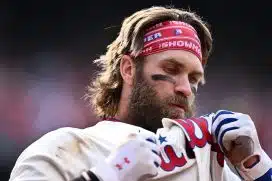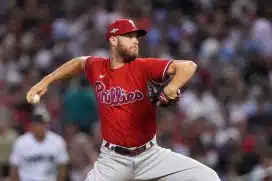By Siobhan Nolan, Sports Talk Philly Contributing Writer
Even though the Phillies’ 2020 season was delayed for nearly five months, shortened to 60 games, and had no fans allowed to attend the games in person, one could make the argument that it’s still not as bad as the two seasons suffered under Gabe Kapler.
Perhaps it’s too easy to mock Kapler at this point—he came into the Phillies organization with no previous managerial experience, had some truly bizarre personality quirks (see: licking ice cream for the taste and then spitting it back into a cup), and failed to connect with the Phillies fanbase (or even his own players) in the two years he was in charge. The Phillies required a manager who was experienced, down-to-earth, level-headed, and patient, seeing as it became increasingly evident that this team wasn’t capable of being transformed overnight. They were in dire need of a leader who was able to lay down the law without completely alienating the clubhouse.
Enter, Joe Girardi.
Simply put, Girardi is a winner. In a decade with the New York Yankees (which is an impressive feat in itself), he collected six playoff appearances and one World Series championship. He employs an ideal combination of modern analytics and data and old-school intuition to push players to be their best. Lastly, and possibly most importantly, Girardi has integrated himself into the community since the day he was announced as manager. From having breakfast with Charlie Manuel to making an appearance with the Phillie Phanatic at the 2019 Rocky Run and actively participating in charity events with the rest of the team, Girardi made it clear that his commitment to the Phillies extends well beyond the clubhouse.
However, the most indispensable thing that Girardi brings to this team is his mindset. In his introductory press conference he said, “…I want to win. And that’s why I came here because I think there’s a great opportunity to win here…we need to do whatever it takes to win. We have to trust each other, we have to be accountable to each other, we have to respect each other.” Literally from day one, he made it crystal clear that he was there to take the Phillies back to the top of their game. He acknowledged that cohesion and mutual respect are invaluable assets of a winning team. He understands that holding the coaches and players accountable is essential to helping a team grow, especially in a city that refuses to allow their teams to be “lovable losers.”
This debutante season, while it was mercifully allowed to happen at all, is not the fairest way to judge Girardi’s impact on the team. Was he going to turn everything around in one season, global pandemic notwithstanding? No. But have there been noticeable improvements in individual players that struggled last year, along with better team chemistry overall? Absolutely. Girardi’s playing the long game—he understands that sustainable improvement can’t be rushed. He’s integrating his tactics slowly but surely, and while fans may be pining for a quick fix that brings back the late-2000s glory days after what feels like eons of disappointment, Girardi is reminding us who won the race between the tortoise and the hare.
Everyone knows that good things come to those who wait.







